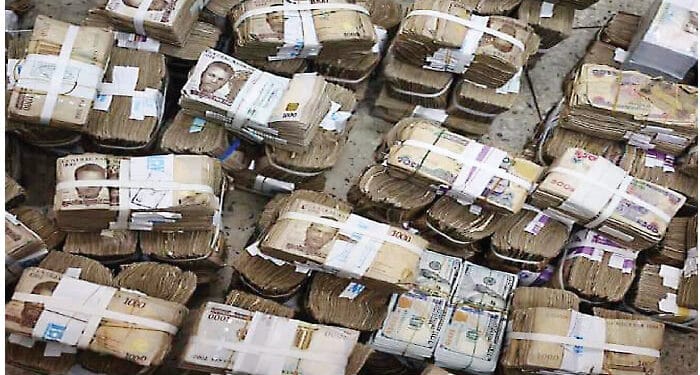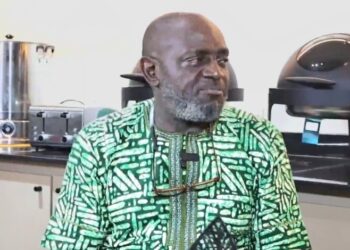Days after the Central Bank of Nigeria announced the redesign of the N1,000, N500 and N200 notes, with a directive that the current notes be remitted to the commercial banks, wealthy individuals and organisations with huge cash stashed away have begun depositing them
Our correspondents gathered from sources and workers in the operations department of many commercial banks that even though customers have yet to rush, there has been a gradual increase in the volume of cash and amounts remitted by customers.
The Governor of the CBN, Mr Godwin Emefiele, while announcing the issuance of the new naira notes on October 26, said bank customers should start paying their current notes to enable them to withdraw the new banknotes once circulation begins on December 15, 2022.
Emefiele said the apex bank had become concerned over some daunting challenges in managing the existing banknotes in circulation, especially those outside the banking system, noting that such portends some consequences for the integrity of the CBN and the country.
Among the challenges that informed the decision, he lamented the “significant hoarding” of the banknotes in which case N2.73tn out of the N3.23tn currency in circulation as of September 2022 was outside the vaults of the commercial banks across the country. He also cited the worsening shortage of clean and fit banknotes, the increasing ease and risk of counterfeiting evidenced by several security reports and compliance with global standards to circulate new legal tender every five to eight years.
He noted further that the naira redesign would help to rein in the currency outside the banking system and make its monetary policies more efficacious, deepen its cashless economy drive and minimise incidents of terrorism and kidnapping as the access to large sums used for a ransom payment.
He noted, “On the basis of these trends, problems, and facts set out above, and in line with provisions of Sections 2(b), section 18(a), and section 19, Subsections a and b of the CBN Act 2007, the Management of the CBN has sought and obtained the approval of President Muhammadu Buhari to redesign, produce, release and circulate new series of banknotes at N200, N500, and N1,000 levels.
“In line with this approval, we have finalised arrangements for the new currency to begin circulation on December 15, 2022, after its launch by President Muhammadu Buhari. The new and existing currencies shall remain legal tender and circulate together until January 31, 2023, when the existing currencies shall cease to be legal tender.”
Huge cash deposits
Meanwhile, our correspondents’ interactions with many bank staff indicated that individuals have begun depositing huge cash sums stashed away with commercial banks.
A top banker with one of the first-generation banks, who spoke on condition of anonymity, said there was a gradual increase in the sums of money being deposited by some customers. “We have seen an increase in the amount being brought to some of our branches by some customers,” the source said.
When asked the highest amount an individual had remitted so far, the source, who heads a bank branch in Oshodi, Lagos, said, “The amounts vary, but we have seen people bring between N5m and N20m cash. It’s only rich customers that can have huge sums stashed away. The poor live on daily income and can hardly have enough to save.”
He said it was easy to identify the money stashed away for a long time because of the smell, the dates on them and other elements she refused to disclose. “There are ways to identify them but I don’t want to go into that because the CBN policy focuses on rein in the volume of cash in circulation. The regulators would deal with the rest.”
The branch manager of another first-generation bank in the Ikoyi area of Lagos confirmed to Saturday PUNCH that the amount of cash deposited by some customers has already risen.
She said, “The normal deposit by average income earners and businesses continues, but some customers have been coming with huge sums to deposit. We have seen some persons bring N2m cash and there have been higher and lesser amounts respectively from some other branches.”
Meanwhile, senior staff at the headquarters of another first-generation bank noted that feedback from some of their branches showed that some customers brought in billions, some millions, and some hundreds of thousands.
The source said, “When the redesign of the naira was announced, the CBN asked all the banks to report the amount in their vault per day so they could monitor the remittances across the board. The way it works is that branches route that information through their respective zones and the zones supply the information to the headquarters.
“We have to protect the customers, even if you suspect the possible source of such funds. The information from some of our branches indicates that in the last few days, specifically since October 26 when the CBN made the announcement, there have been individuals who brought in billions while some came to deposit millions.
“From what the CBN governor said in his briefing, he said about 85 per cent of the cash in circulation was outside the bank vaults and that alone is over N2tn, which shows that we might even see more billions being brought to the banks for remittance in the coming days.”
“But I can tell you that across all the financial institutions, there has been a surge in deposits. It’s not natural; the naira redesign and the fact that the Economic and Financial Crimes Commission has been going after some people have made it so. How come we have over N2tn in people’s hands?
“I have had interactions with some of my colleagues in other banks and they confirmed that it’s the same in their banks. The deposit has been in billions. It might come as a surprise to many, but it’s the reality. I came across a report that some states are considering paying salaries in cash because they have stashed away huge cash and they need to expend it.”
Similarly, a senior management staff member of another commercial bank, told Saturday PUNCH that the huge cash deposits being witnessed justified the concerns expressed by the CBN in its October 26 briefing.
The source said, “The CBN said about N2.73tn is outside the banking sector, no economy in the world can survive such a percentage of its money in circulation being outside the bank vaults. That policy must have been well thought out because people are already making huge deposits.
“I can’t tell you how much has been deposited so far, because the CBN gave a reporting line to know how much is coming in, but people have been coming to make deposits. If you look at the amount so far paid as ransom, you would imagine the volume of cash in circulation and then people keep a lot of money in the bush and other places.
“I sense that people who kept money would have issues bringing them in now because it raises suspicion and doesn’t forget that banks are under obligation to alert the anti-graft agencies like the EFCC, and the Nigerian Financial Intelligence Unit, in accordance with the Money Laundering (Prevention and Prohibition) Act.”
The source revealed that the heads of Corporate Communications Departments interacted with the CBN three days ago to ensure that they worked in sync with the CBN and that the exercise was hitch-free.
Across other banks where our correspondents interacted with senior staff, they affirmed a noticeable increase in the volume and amount of cash being brought for deposit.
Saturday banking begins
Meanwhile, the Central Bank of Nigeria (CBN wrote to the banks about implementing the naira redesign policy. The memo was titled ‘Re: Implementation of naira Redesign Policy.’.
In a memo signed by the Director of Banking Supervision, Haruna B. Mustapha, with Reference Number BSD/DIR/CON/LAB/015/064, dated October 31, 2022, the apex bank said banks’ currency processing centres “shall remain open from Monday to Saturday to accommodate all cash that will be deposited by customers.”
‘Don’t split deposits’
The apex bank, in the memo, said that in furtherance of the Emergency Bankers’ Committee meeting on October 28, 2022, and as part of arrangements to ensure the seamless implementation of the new currency redesign policy, it decided that large deposits should not be split into different accounts under any circumstance. It also warned that no cash deposit by any customer should be rejected, provided such deposits were lodged into an account with a BVN.
It added, “All deposits by new or walk-in customers should be accepted by banks subject to compliance with the requisite account opening documentation and KYC requirements. No deposit should be boxed and/or credited to any suspense account, general ledger or other internal bank account.
“Splitting of deposits is not permitted under any circumstance. All unusually large deposits should be paid into customers’ accounts with BVNs as a bulk amount.”
It also charged banks with ensuring full compliance with extant Anti-Money Laundering/Combating the Financing of Terrorism regulations on reporting currency and suspicious transactions. It stressed that banks should ensure that customers were promptly attended to and well treated to avoid delays, long queues, or congestion in banking halls.
“Banks shall deploy measures to detect fake or counterfeit notes and avoid any form of competition to ensure a smooth implementation of the policy,” it added.
Regarding reporting, the apex bank said, “Banks are required to furnish the CBN with their daily vault cash position effective October 26, 2022, in line with the attached template. The first set of returns up to November 1, 2022, is due before the closing of business on November 2, 2022.
“Thereafter, banks are to provide the daily returns on their cash position on or before 10am of the business day following the reporting date.”
The CBN noted that the deposit of mutilated notes in the denominations covered under the dispensation (N200, N500, and N1,000 denominations) would be permitted without fees. It added that mutilated notes received would be processed in due course to check for counterfeit, forged, or composed notes. However, it noted that banks would be responsible for any defective notes and shortages in line with extant regulations.
The CBN stressed that until January 31, 2023, the present notes remained legal tender and should not be rejected. It noted that no bank customer would bear any charges for cash returned/paid into their accounts, as bank charges for cash deposits above limits had been suspended with immediate effect.










